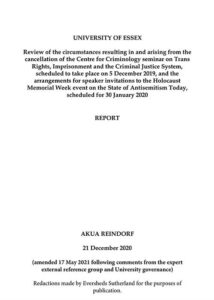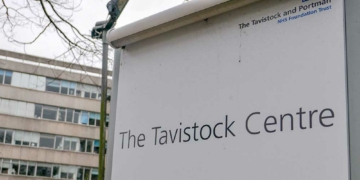Things must be a bit tense today at Stonewall, it seems uncomfortable questions are finally being asked about their role in the suppression of free speech on university campuses, writes Jo Bartosch.
An independent review released today by University of Essex recommended: “If the University considers it appropriate to continue its relationship with Stonewall, it should devise a strategy for countering the drawbacks and potential illegalities…”
The review itself was commissioned following the cancellation of two feminist academics, Professors Rosa Freedman and Jo Phoenix. Last year Professor Freedman had been booked to speak on a panel called ‘The State of Antisemitism Today’ as part of a series of events marking Holocaust Memorial Week. In the run-up to the event there were internal discussions about Professor Freedman’s views on sex and gender and a decision was made to not invite her, despite Professor Freedman previously being assured of a place on the panel. In the days that followed a member of the University posted a tweet which compared her views on gender identity to Holocaust denial. The review recommended that Professor Freedman be offered an open apology.
Professor Phoenix was also offered an apology. Professor Phoenix was due to give a seminar entitled “Trans rights, imprisonment and the criminal justice system.” According to the independent review: “On the day of the seminar, complaints were made that Professor Phoenix was a “transphobe” who was likely to engage in “hate speech”. There were reports that people felt unsafe and threatened by the prospect of her appearing on campus.”
Professor Phoenix told Lesbian and Gay News that whilst she welcomed the report “waiting for 18 months for this apology has been very painful.” She suspects living under suspicion has impacted on her career:
“I have had to endure other people’s accusations of me being transphobic on the grounds that I was cancelled – or on the specious and wilful misinterpretations of my WPUK [Women’s Place UK] talk. Whereas once I would receive around 10 – 15 invitations to speak at various universities, since Essex cancelled my talk, I have had only two invitations. I don’t know if the cancellation or COVID caused my sudden unpopularity.”
Fliers handed-out prior to the cancellation of the talk included examples of allegedly ‘transphobic’ comments made by Professor Phoenix together with an image of a gun and the words ‘Shut the F**K Up TERF.’
Fliers handed-out prior to the cancellation of the talk included examples of allegedly ‘transphobic’ comments made by Professor Phoenix together with an image of a gun and the words ‘Shut the F**K Up TERF.’ The review notes that the University of Essex failed to take immediate action regarding the offensive flier.
In addition to the impact on freedom of speech, Professor Phoenix has concerns about the advice given to universities by transgender lobby groups. She notes:
“The report sets out in extremely clear terms how following a ‘simple’ misrepresentation of the Equalities Act 2010 to include ‘gender identity’ can result in stopping academic debate of trans rights, or of the necessity to maintain sex-based rights… Universities must act upon the hectoring and bullying of those who hold gender critical views, especially when that hectoring comes in the form of violent and profane imagery and language.”
“This is an important report. It ought to be a must read for ALL university executive officers and most especially for any university that has too blindly accepted advice from organisations like Stonewall about how to interpret the Equalities Act 2010, and about the tensioning about trans and sex-based rights.”
In response to the independent report Liz Ward, Director of Programmes at Stonewall, told Lesbian and Gay News: “We are incredibly proud of our longstanding relationship with the University of Essex through the Stonewall Diversity Champions programme. It’s so important that universities create an environment where LGBTQ+ staff and students feel safe, are treated fairly and can thrive. We provide expert advice to more than 850 organisations who are members of the Diversity Champions programme. Our advice on the Equality Act is based on guidance provided by the Equality and Human Rights Commission, which was recently reaffirmed in the High Court.”

University of Essex independent report by barrister Akua Reindorf
Offering both professors an apology, the university’s vice-chancellor Professor Anthony Forster said: “The report makes clear that we have made serious mistakes and we need to do our very best to learn from these and to ensure they are not repeated.
“The review notes the particular responsibility placed on universities to protect freedom of speech within the law, and to ensure that a diversity of voices and views can be heard on our campuses.”
At present, Stonewall lists 121 universities as members of its ‘Diversity Champions’ scheme. Similar stories of academics and students being investigated for expressing ‘gender critical’ beliefs are surfacing across the UK. A group called the GC Academia Network has recently been established to counter the suppression of feminist thought within universities. Published on the website are hundreds of stories and examples from people in universities across the UK who feel unable to openly adopt a sex-based approach to research and analysis.
Last week The Times reported on the case of law-student Lisa Keogh who was investigated by Abertay University and is facing expulsion for commenting that women have vaginas and that “the difference in physical strength of men versus women is a fact”. The university’s definition of misconduct includes “using offensive language” or “discriminating against gender reassignment”.
The review into the disinvitations of Professors Freedman and Phoenix notes that the right to freedom of expression is protected by the European Convention on Human Rights. It quotes the Convention: “This right shall include freedom to hold opinions and to receive and impart information and ideas without interference by public authority… This is because if the right to free speech did not protect “the irritating, the contentious, the eccentric, the heretical, the unwelcome and the provocative” it would be “not worth having.””
In light of the review, the 121 universities which pay for membership of the Stonewall Diversity Champions scheme would do well to reconsider their membership. Stonewall have long argued that there is ‘no debate’ to be had with regards to rights based on gender identity. Today’s review has shown that to be wrong. If Stonewall are to retain any credibility they must accept that that plurality of opinion is central to a democratic society. No amount of complaining about ‘phobias’ or hyperbole about ‘feeling unsafe on campus’ can justify the suppression of free speech. Stonewall can’t control public opinion; they need to accept and GET OVER IT.
























Comments
No comments yet, be the first to leave a comment.